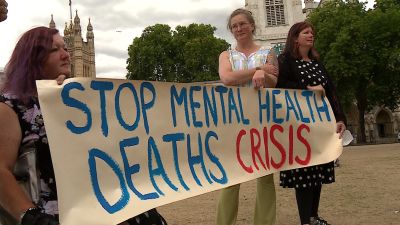Norfolk and Suffolk mental health NHS trust branded 'unsafe' by doctors

Doctors at a failing mental health trust say patients are left "unsafe" and they have little confidence in the board that runs the NHS trust.
Norfolk and Suffolk Foundation Trust (NSFT) has long been struggling and earlier this year it was slammed by the health watchdog, which rated it inadequate and served it with a "warning notice" to improve.
In a two-page letter, seen by ITV News, clinicians from the trusts' medical staffing committee - which represents more than 140 doctors - have written to the trust's chair, Zoe Billingham, requesting an urgent meeting.
The revelations have prompted one MP in the region to ask for the government to step in and take over the trust.
The signatories say “clinical services are both unable to provide good basic care and are unsafe”, with doctors left feeling like "clinical workhorses... carrying huge caseloads and holding unacceptable clinical risks".
Ms Billingham, who became chair of the NSFT late last year, had promised to drive a new culture - one of transformation and transparency.
However, the letter said there was “a lack of transparency [...] general dysfunction [with trust management and] widespread demoralisation of the medical staff with regular resignations”.
Doctors add: “We are calling for a major change in the operation and performance of the trust”.
The trust has been approached for comment but has not replied.
Responding to the letter on Twitter, Ms Billingham wrote: "Some things we can and are fixing more rapidly; but 10 years of underperformance and deep rooted cultural issues take time to turn around. No excuses: we must and will get better."
The doctors' concerns are collected under four headings: staffing, trust management, culture and marginalisation of medical staff.
Staffing: Doctors say that recruitment and retention of staff is an issue, and "in some circumstances, the clinical services are both unable to provide good basic care and are unsafe".
Trust management: "There is a general dysfunction with both perpetual changes of personnel in key executive posts and ever increasing layers of management at senior, middle and service level," the doctors write.
Culture: They say the trust does not "prioritise clinical work or engage effectively with frontline clinicians", adding that major decisions are often made "by a handful of people at executive level without clinical consultation". There is a lack of transparency and poor communication, while micromanagement has restricted the effectiveness of local care groups, they add.
Marginalisation of medical staff: Consultants and doctors feel excluded from "key discussions" over patient care, saying their "expertise is not utilised." They add: Doctors are, by and large, regarded as clinical workhorses, many carrying huge caseloads and holding unacceptable clinical risks.
For years the families of those who lost loved ones have also been campaigning for change.
They have taken their fight to parliament to call for a public inquiry, and have made their case by hanging up the names of loved ones who died outside Hellesdon Hospital.
In the two years before the pandemic on average 49 people per month died within six months of contact with the trust, according to health watchdog the CQC.
The CQC found that staffing levels were often unsafe, waiting lists were long and not managed properly and patient records were inaccurate.
At the time of the report being published in April Craig Howarth, the head of inspection for mental health and community services, said: "A significant factor behind the trust’s shortcomings was its lack of enough staff to meet patient need, a problem many mental health trusts are encountering.
"If our next inspection finds insufficient improvement, we will take further enforcement action to protect people from the risk of avoidable harm and hold the trust’s leaders to account.”
The Conservative MP for North Norfolk, Duncan Baker, said there was a "tsunami of unmet need"
He said the "only way we can get through this very, very, very concerning set of events [is] direct control and special measures from the government.”
Want a quick and expert briefing on the biggest news stories? Listen to our latest podcasts to find out What You Need To Know.